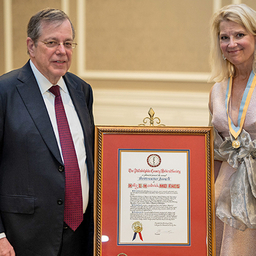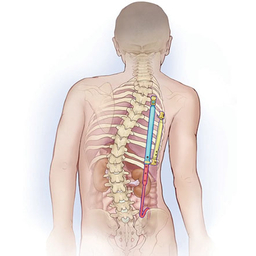
CHOP Surgeon Holly L. Hedrick, MD Wins Strittmatter Award
Jun 13, 2023
The Philadelphia County Medical Society (PCMS) has awarded CHOP surgeon Holly L. Hedrick, MD the 2023 Strittmatter Award, its most prestigious scientific honor.
Here at the Pulmonary Hypoplasia Program, you have access to a team with a rare depth of knowledge, including specialists from neonatology, pulmonary medicine, cardiology, general surgery, nutrition, audiology, behavioral health, social services and more.

Jun 13, 2023
The Philadelphia County Medical Society (PCMS) has awarded CHOP surgeon Holly L. Hedrick, MD the 2023 Strittmatter Award, its most prestigious scientific honor.
Mar 6, 2023
A range of different noninvasive mechanical ventilation supports helped this patient with pulmonary hypoplasia avoid tracheostomy.
Feb 3, 2023
Learn how CHOP’s dedicated CDH team translates research findings into care advances that improve the lives of children with this condition.
Mar 23, 2021
CHOP's specialized Pulmonary Hypoplasia Program provides ongoing developmental and medical assessments from infancy through adolescence, with the goal of looking beyond short-term surgical survival and providing long-term clinical care to improve quality of life.
Mar 23, 2021
Early recognition, treatment and management of CDH-related pulmonary hypertension is critical. Our team takes an early and aggressive approach to treatment, and our protocols have been extremely successful.
Oct 2, 2020
CHOP collaboration with Nestlé Health Science elevates an idea that is a win for families.

Feb 1, 2018
We evaluate hundreds of children from around the world and offer complete care — from evaluation through long-term follow-up — for severe spine and rib cage abnormalities.
Sep 15, 2015
The Pulmonary Hypoplasia Program at The Children’s Hospital of Philadelphia is committed to tracking outcomes of children with pulmonary hypoplasia in an effort to improve understanding and care. A recent review of neurodevelopmental outcomes at 5 years of age found that CDH survivors are at increased risk for developing emotionally reactive and pervasive developmental problems.
Sep 15, 2015
Neonates with congenital diaphragmatic hernia (CDH) often require intensive treatment after birth and have prolonged hospitalizations, and may suffer a variety of complications after discharge. Comprehensive interdisciplinary follow-up care is critical for long-term well being.